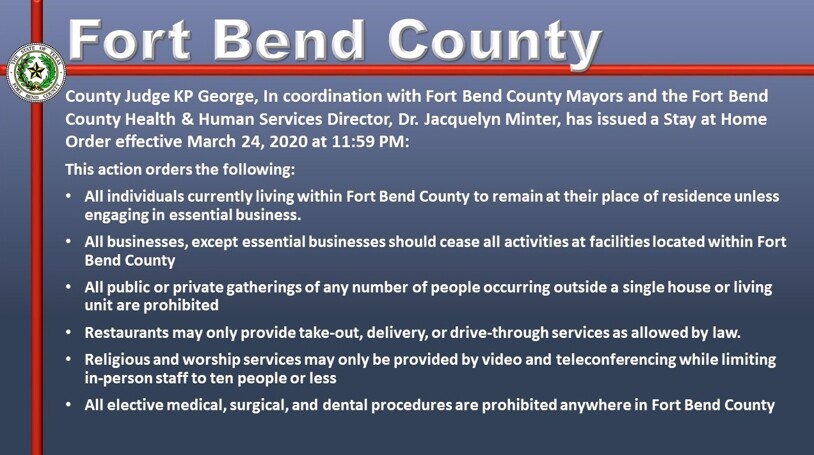Yesterday, Fort Bend County Health and Human Services reported an additional 8 cases of COVID -19 for a total of 54 cases. For the latest and official COVID-19 cases, go to the Fort Bend County Health & Human Services Dashboard at https://www.fbchealth.org/ncov/.
Ft. Bend recorded its first case on March 4, 2020. As is typical of earlier regional cases, there was an extended period of low cases. However, exponential growth began around 3/16/2020 with a doubling of cases every 3 – 4 days after that. By that time, it became clear that “community spread,” meaning certain cases did not have identifiable sources, started. On that same day, Fort Bend County issued its first orders to close restaurants without drive-in or drive-through services, bars, night clubs, lounges, taverns, arcades, and private clubs.

Earlier this week, on March 24, Fort Bend County Judge KP George amended county orders for residents to remain at their place of residence and to close “nonessential” businesses, amongst other directives.

Current Progress in the Fight Against COVID-19
How do we compare with the other regions and the rest of the world? Italy and South Korea are recent examples of opposite extremes. Currently, Italy has had 7503 total deaths, the highest in the word, and 743,386 cases. In the past six days, there have been 600+ new deaths each day. The number of patients in severe condition of overrunning the capacity of available Intensive Care Units and Ventilators, force health providers to make terrible life and death decisions on who can use that equipment. On the other hand, South Korea, which has a similar population base (51 in S. Korea versus 60 million in Italy) and where the exponential rise COVID-19 started approximately the same time, South Korea has experienced a total 131 fatalities and 9241 cases to date. Importantly, the increase of cases per day, after a maximum of 1062 on March 1, in the past 15 days, has been relatively stable, with an average below 100. So the caseload was well within the capacity of the South Korean Health Care system. The purpose of all the severe measures we are taking is so that we can be closer to the South Korean Results and further away from the Italian Results.
But how can we compare the Fort Bend population of ~770,000 with regions with these regions that have very different counts and started much earlier? We attempted to this by normalizing the number of residents and the time interval. To account for the population differences, we divided the case numbers by the population and expressed it on a per 100,000 population basis. To normalize the time scale, we started the time interval when exponential growth started to become apparent in all regions and chose a level of 0.1 cases per 100,000 as our reference point. We obtained all of our non-regional raw data from Wikipedia, Houston Metro data from the Houston Chronicle interactive map, and Ft. Bend data from the Fort Bend County Dashboard. We did this analysis for the total United States, Houston Metro, Fort Bend, Italy, South Korea, New York, and California.
For our area, we compared our region to Italy and South Korea directly.

The data was plotted on a log scale because of the very large differences in numbers from beginning to end. When plotted like this, it is clear that South Korea has reached an equilibrium level that they can control. However, the case count for Italy is an order of magnitude higher and is still rising. While, the rate of increase seems to be leveling and an equilibrium position will be reached, this is still unacceptably high because the health care system is overrun. On a per capita basis both Houston Metro and Ft. Bend County appear to be below where South Korea and Italy where at the same time with respect to number of days since there was approximately 0.1 cases per 100,000. That is welcome news. However, we are still in the exponential growth phase. Flattening the curve mean delaying the peak and ultimately lowering it, so that the total case count is below the ability for our health care systems to handle the case load. If we stay below the level of South Korea, that means less than 131 COVID-19 case per 100,000 population. Translated to the Houston Metropolitan area, with an estimated 20% of cases needing hospitalization, that means keeping below 9242 ICU patients. That is a high number, Houston Metro has approximately 20,000 units based on national averages (1 ICU Unit per 357 population), so it will clearly tax our system given the units are generally occupied, but with extraordinary measures that area hospitals are taking it hopefully manageable.
On a larger regional scale, we see the following.

While California and Metro Houston appear to be on track to flatten the curve, overall, the USA seems to be on the same path as Italy. New York is especially problematic. The cases per capita are higher in New York than in Italy. While the fatalities in New York are many times lower than Italy, we have to keep in mind that there is a 14 – 21 day lag between cases and deaths. Furthermore, the rate of increase is steeply exponential and does not appear to be anywhere close to a flattening. Unfortunately, the case numbers of COVID-19 in New York and the larger USA will get worse before they get better.

About the Authors, owners of AFC Urgent Care Richmond
As long-time residents of the Richmond and Sugar Land area, Sol and Adriano have been active members of the community. They have been owners of AFC Urgent Care Richmond for the past several years. Sol is the operations manager for the clinic and has Medical Degree from the University of Caraboboa and was a resident Ophthalmological Surgeon in her native country, Venezuela. Adriano is the center's general manager, leveraging several decades of technical, commercial and marketing experience in Oil & Gas. They participate in and sponsor local non-profit organizations such as Boy Scouts of America and Shape Up Fort Bend.


